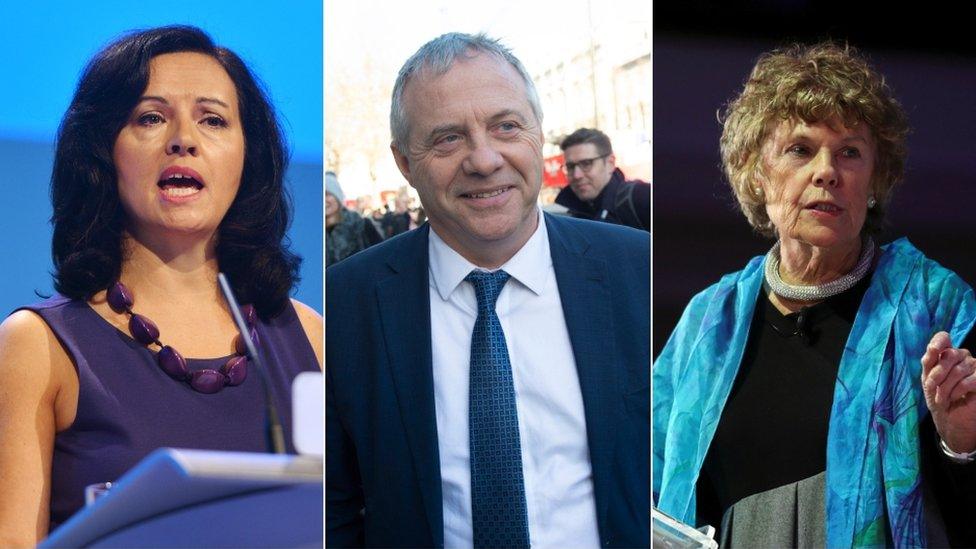Calls for Labour MPs to face disciplinary action over Brexit votes
- Published

Caroline Flint, John Mann and Kate Hoey were among 25 rebels on Tuesday
There have been calls for Labour MPs to face disciplinary action for rebelling against their party over Brexit.
Seven Labour MPs voted with the government on Tuesday for an amendment calling for "alternative arrangements" to the backstop part of the PM's deal.
Fourteen Labour MPs also voted against a cross-party amendment to delay Brexit, which had the party's backing.
Labour leader Jeremy Corbyn said he was "disappointed" with the members who voted with the government.
And he said the party would be having discussions with them in the coming days.
The BBC's political correspondent Iain Watson said other Labour MPs were calling on Mr Corbyn to take action against the rebels.
MPs voted on a string of amendments on Tuesday to alter the direction of Theresa May's Brexit deal - after her original plan was voted down by Parliament earlier in January.
The "Brady" amendment - tabled by Tory MP Sir Graham Brady - sought to make changes to the backstop, which is the insurance policy aiming to prevent checks on people and goods returning to the border between Ireland and Northern Ireland after Brexit.
The backstop was one of the main reasons Mrs May's deal was rejected, as critics said it would give a different status for Northern Ireland - threatening the existence of the UK - and they feared the arrangement could become permanent.
The seven Labour MPs voting for the backstop amendment were Ian Austin, Sir Kevin Barron, Jim Fitzpatrick, Roger Godsiff, Kate Hoey, John Mann and Graham Stringer - all long-standing supporters of a Brexit deal.
And the amendment won the support of the Commons by a majority of 16 votes.
Mrs May said the victory gave her a mandate to return to Brussels and seek to re-open negotiations over the backstop.
The seven also voted against an amendment tabled by Labour's Yvette Cooper that wanted to introduce a bill to delay Brexit by up to nine months to prevent the UK leaving without a deal on 29 March.
Despite the Labour leadership calling for MPs to back the amendment, the seven were joined by seven more Labour MPs from Leave-backing towns in the north of England and the Midlands in voting against it: Ronnie Campbell, Rosie Cooper, Caroline Flint, Stephen Hepburn, Dennis Skinner, Laura Smith and Gareth Snell.
Another 11 Labour MPs abstained in the vote: Eight shadow ministers - Tracy Brabin, Judith Cummins, Gloria De Piero, Yvonne Fovargue, Mike Kane, Emma Lewell-Buck, Jim McMahon and Melanie Onn - and three backbenchers - Ruth Smeeth, John Spellar and Stephen Twigg.
Asked about MPs who had defied the Labour whip to vote against Yvette Cooper's amendment, Mr Corbyn said he was "very disappointed". He said, after discussions with Ms Cooper, she had agreed to reduce her suggested delay from nine months to three months.
He added: "On that basis, I recommended all Labour MPs should support it. Sadly a small number decided not to. We will be dealing with that issue ... by speaking to them and sanctions may or may not apply after those discussions."
'New model Labour'
Labour MP Mike Gapes accused his party's leadership of double standards for not taking action yet, citing the removal from shadow cabinet of former leadership challenger Owen Smith, who was sacked in March 2018 after calling for a second referendum.
"We could have actually won on the Yvette Cooper amendment," he told the BBC. "[But] not everyone on the front bench was there to support it.
"In the new model Labour Party, friends of Jeremy Corbyn are not sacked, but other people are sacked."